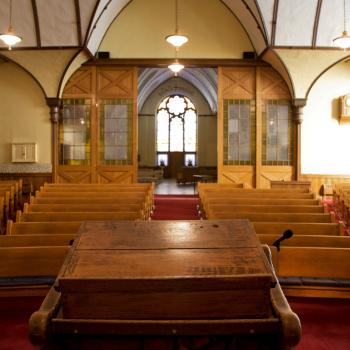What Happens When Hope Dies?
Ben Franklin once said that many people die at 25 and we only get around to burying them when they reach 70. Whatever his motivation for the saying, if he were referring to the death of hope, then he was right. When hope dies, the power to strive dies along with it. Funerals for dreams and imagination soon follow. When hope dies, the only things that remain are our coping mechanisms. Food, substances, pleasure, and comfort all become life enrichment plans or life replacement plans for the hope-deprived. We can exist without hope, but it is hard to say we have anything like life without it. We muddle on lifeless until burial. Hope, however, is hard because it takes courage.
Life Grinds Out Hope
We are born with hope in us, but life can grind it out. By the time we are adults, our hopes have been dashed enough that we do not risk hope anymore. Disappointment is so powerful, so destructive, that we cannot emotionally bear the weight of hope anymore.
Life is often full of disappointments. Just this week, one of my daughters had a full-blown crying spell because she did not get a doughnut for breakfast. In retrospect, not getting a doughnut is probably worth shedding a tear over. They are little sugary delights that remind us God loves us and wants us to be happy. Adults do not tolerate tears over such matters, though. We know that worse indignities will happen along the way. One might as well get used to not getting one’s way.
Christmas and Legos
Disappointment is a normal part of life. It starts small. We hoped for Legos from Grandmama as a Christmas present. When we got to her house for Christmas dinner, the box with our name on it, bedazzled in gold ribbons and red paper, beckoned us from across the room. We grabbed the box long before time to open our present. “Presents are for after dinner,” Mom said with a knowing smile.

Before putting the present back under the tree for an interminable supper, we felt the wrapper for any sort of clue as to what might be in the box. Was it a Han Solo Lego set? Could it be Luke Skywalker or Boba Fett? Shaking the box, we hoped to hear the telltale rattle, informing us that our expectations were true. Waiting patiently through dinner, or maybe not so patiently, we kept one eye on the box and one on the desserts.
Finally, dinner ends! Finally, it is time to open our presents! We and the other children tear into our packages like a loosed band of hungry wolverines going after prey. Ripping through the ribbons and paper, we got to the white garment box from Belk’s, and it was taped closed! “Dad, help!” While we nearly exploded with anticipation, Dad slowly pulled out his pocket knife and cut the clear scotch tape. After what seemed like hours, we got our presents opened. Throwing the top of the box to the side and shoving the tissue paper away revealed… socks. Then mom says with unmitigated audacity, “Say ‘thank you.'” We hoped for Legos and we got socks.
All Too Common
We all know something of that feeling. We hoped the girl or boy would like us back and they laughed at us. Our boss called us for a meeting, and we thought we were getting a raise. He gave us our termination notice. We pray and pray and pray for a loved one’s healing, and nothing. Disappointments are part of life. They, perhaps, are more normal than any other outcome. After all of the disappointments we face, no wonder we get nervous about hope.
Bad Definitions
Perhaps all of our inability to hope is because we define the term incorrectly. When we hear “hope” we often think “optimism,” but hope is distinct from optimism. Optimism is the belief that “things have a way of working out.” “If we just keep going better days will come,” the optimist says. Optimism is the choice to believe in the goodness of the world and others. It believes that events will order themselves given enough time and positive thinking. Optimism is born out of experience, and it is a very good trait. It is not, however, hope.
Hope recognizes that while in much of our experience, the world and other people can be good, that is no guarantee about now. This current situation may or may not work out, but that is irrelevant for those who have hope. Their trust is not in the situation but in God. Hope is the ability to trust that God is at work, always has been at work, and will remain at work for our eternal good. It is an unshakable confidence in providential care and the power to make broken things and broken people whole again.
Hope Holds On
There resides a deep tenacity in hope. The hope of the Scriptures survived 400 years of slavery, the people’s rejection of Samuel, the failure of Saul, David’s criminal behavior, Solomon’s fall into idolatry, and Israel’s division and destruction. It survived exile and oppression. Like a cactus growing in a crack in the sidewalk, hope survives when it should not. A concept as powerful as hope cannot be mere optimism. It can only survive as an outgrowth of trust in God.

Of Hope and Fear
Hope is a bit terrifying, though. It is like standing over the edge of the Grand Canyon and peering down to the basin below. Only those who dare to stand at the edge can look in awestruck wonder and the Colorado River and the path it has cut in the rocks for millennia. Those who want to stay at a safe distance will remain safe. The wonder and mystery just below them, however, will be just out of reach.
The same is true for hope. Those who refuse to risk hope will be emotionally safe. They will not be disappointed because they never hoped in the first place. Think of it this way, it is hard to disappoint Eeyore from Winnie the Pooh. He is happy if anyone notices. If no one does, he is okay too. What the old, grey donkey cannot know is the thrill of hoping, the thrill of asking “Is it Christmas,” every day like small children do. He knows it is not. He would rather sit in the gray today than hope for a sunny tomorrow. Do you people like that? Are you like that? Are you afraid to hope?
Hope and Courage
Hope is the word for people who dare. It is for people who know disappointment well enough to despise it and not be intimidated by it. It is a word for those who long for the world to be better, see no easy way to make it better, and still hope. Their hope is not in themselves or their wisdom. It is not in the fickle generosity of fate. Their hope is in God.
Those who believe in Jesus Christ share in Israel’s hope and Abram’s hope. God had promised Abram that He would make a great nation out of his lineage. Abram had no children. To hope in God’s promise was as foolish as to hope that God might bring someone back from the dead, and yet Abram hoped. His hope was not in vain.
Small Victories
Sometimes our hopes need a little recalibration or reset. Small victories go a long way toward inspiring hope for those whose hopes are a bit down. Perhaps that is why Christians celebrate Christmas with such passion. A baby, a young woman, a promise often forgotten, a town nobody cared about anymore, a befuddled bunch of shepherds, and a manger are all testimony to the small beginning, of our faith. The Christ Incarnate has come, and we have hope.
Our hope will never be finally disappointed because we place it in God.












